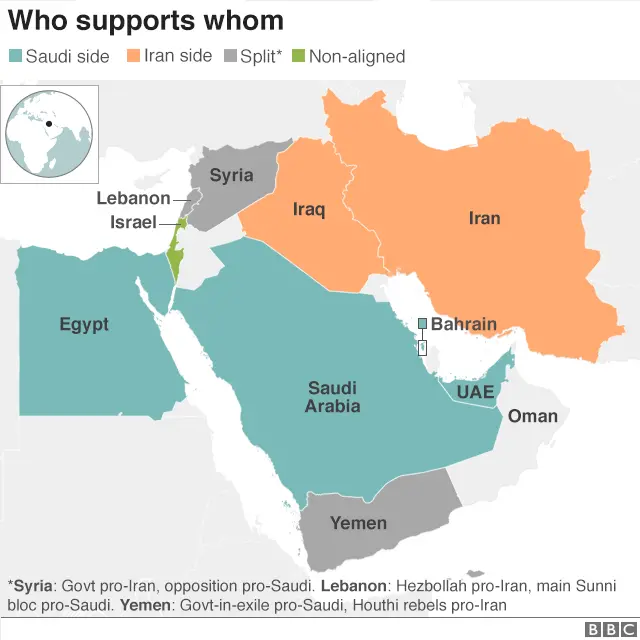Saudi crown prince warns of 'Iran threat' to global oil
Saudi Crown Prince Mohammed bin Salman has warned that oil prices may soar if the world does not act to deter Iran.
He said failure to act could embolden Iran and lead to war, which he said would ruin the global economy.
The prince was speaking after an attack on oil facilities which he blames on Tehran. Iran said the remarks would "bring [the Saudis] nothing but shame".
Mohammed bin Salman also said he accepted some responsibility for journalist Jamal Khashoggi's killing.
But, speaking to CBS News, he denied personally ordering it.
The prince, who is considered the de facto ruler of Saudi Arabia, is suspected of personally targeting Mr Khashoggi, a Saudi journalist critical of the government in Riyadh.
Mr Khashoggi was killed in Saudi Arabia's consulate in Turkey on 2 October 2018.
In an interview with CBS' 60 Minutes news programme on Sunday, he said: "I take full responsibility as a leader in Saudi Arabia, especially since it [the killing] was committed by individuals working for the Saudi government."
However, he denied ordering the killing of Mr Khashoggi directly, or having knowledge of it at the time.
Saudi authorities have since blamed a "rogue" operation for his murder and put 11 men on trial.

You may also be interested in:

The prince also appeared to offer talks for a political solution to the civil war in Yemen, where government forces backed by a Saudi-led coalition are fighting Houthi rebels supported by Iran.
Iran is Saudi Arabia's regional rival and an opponent of the US, which pulled out of a treaty aimed at limiting Tehran's nuclear programme after Mr Trump took power.
US-Iran tensions have risen markedly this year, with the US blaming Iran on attacks on six oil tankers in the Gulf between May and July. Tehran rejects the accusations.


Remarks betray Saudi vulnerability
There are subtle clues in this interview as to why the Saudi response to the 14 September drone and missile attacks has been so restrained. Note that the crown prince warns that a war with Iran would be catastrophic, not just for his country but for the global economy.
Four years ago, when MBS committed his forces to the disastrous war in Yemen, his response might have been bolder. But the Yemen war has not gone as the Saudis intended while their enemy, the Houthi rebels, are launching ever increasing numbers of drones and missiles across the common border.
The recent attacks on the Saudi oil industry, widely blamed on Iran, did real damage. So the Saudis now know just how vulnerable their critical infrastructure is to any Iranian strike.
On the Khashoggi murder, the crown prince's "taking of responsibility" is a belated acknowledgment of how much unease there still is about this incident in the West. But that, of course, is not the same as admitting any involvement in it, which he and his government still deny.

What about the crown prince's oil warning?
Iran has denied any involvement in the attacks on Saudi Arabia's oil facilities earlier in September, which knocked out about 5% of global oil supply and sent oil prices soaring.
But Mohammed bin Salman, the heir to the Saudi throne, said: "If the world does not take a strong and firm action to deter Iran, we will see further escalations that will threaten world interests.
"Oil supplies will be disrupted and oil prices will jump to unimaginably high numbers that we haven't seen in our lifetimes."
He said the Middle East region "represents about 30% of the world's energy supplies, about 20% of global trade passages, about 4% of the world GDP".
"Imagine all of these three things stop. This means a total collapse of the global economy, and not just Saudi Arabia or the Middle East countries," the prince said.

He blamed Iranian "stupidity" for the attacks, saying there was no strategic goal.
Saudi Arabia says 18 drones and seven cruise missiles were fired on the country's two oil facilities in Abqaiq and Khurais on 14 September. Yemen's Iran-aligned Houthi rebels have said they were behind the attacks.
A week after the facilities were hit, the US pledged to send troops to Saudi Arabia to help defend against further attacks.
What did he say about Yemen?
The prince urged Iran to cease its support for Houthi rebels, saying it would be "much easier" to bring the war to an end.
"Today we open all initiatives for a political solution in Yemen," he said. "We hope this happens today rather than tomorrow."
He welcomed a Houthi ceasefire, announced several days ago, as a "positive step" towards political dialogue.
The civil war has triggered the world's worst humanitarian disaster, with 80% of the population requiring humanitarian assistance or protection.
More than 70,000 people are believed to have died since 2016 as a result of the conflict, according to UN estimates.
What about jailed women's rights activists?
The crown prince said he would "personally follow up" on allegations that women's rights activist Loujain al-Hathloul was tortured in jail.
Ms Hathloul and other activists have been in custody for more than a year, despite organising a successful campaign for rights such as that of a woman to drive and travel without a man's permission.
But the prince said the decision whether or not to release the activists lay not with him, but with the public prosecutor.
Asked why they had been jailed, he said laws had to be respected, even though there were some he disagreed with.
